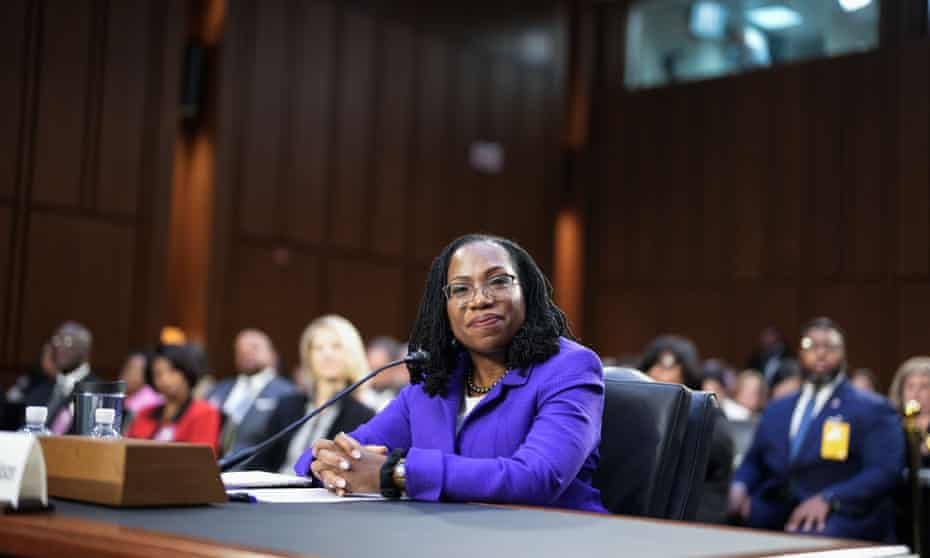Ketanji in the Middle
The Senate Judiciary Committee hearing on the nomination of Judge Ketanji Brown Jackson is at the nexus of several interconnected shifts and plays
Publisher’s Riff
As Day One of the Senate confirmation hearing for federal Judge Ketanji Brown Jackson’s nomination to the U.S. Supreme Court ends, there are more than several rather interesting and highly relevant takeaways in the background that are both ironic and serendipitous in the moment. We should take notice of them …
First: Senate Judiciary Committee Members get way too much time to talk. Put 5-minute limits on that and keep the process more efficient that it already is. Of course, Supreme Court nomination hearings are always designed to put Senators in the spotlight.
Second: Jackson’s confirmation hearing offers something of a brief reprieve in the news cycle away from the media’s ongoing, 24-7, obsessive focus on Ukraine - which, for the moment, gives a small form of breather to the Biden White House.
Ironically, the lone (questionably) Black man on the Supreme Court, Justice Clarence Thomas, mysteriously ends up with flu-like symptons and an infection that hospitalizes him the week of the confirmation hearing for a Black woman who will end up, presumably, being his ideological archenemy. Some might ask: What’s he afraid of?
When we look at this Washington Post table below …
We notice that, if confirmed, Jackson will not only be the first Black woman Supreme Court justice in its 233-year existence, but she will clearly be the most qualified, the most trained and (by far) the most experienced Supreme Court justice. She’s checking off more than all of the boxes, so to speak.
Black women are, and should be, front and center this week. Media outlets should be readily presenting and centering Black woman perspective on this Senate confirmation battle.
Do pay attention to Republicans trial-ballooning and field testing a vicious variety of talking points and dog whistles for their very White and racially charged base. We saw glimpses of that today in rambling trigger-fest remarks from the likes of Senators Lindsey Graham (R-SC), Ted Cruz (R-TX), Josh Hawley (R-MO), Marsha Blackburn (R-TN) and Tom Cotton (R-AR). Every opportunity will be used to not only vilify Judge Jackson as hiding a “hidden agenda,” but to refine messaging around everything from Critical Race Theory to rising violent crime.
Democrats should be watching the rising violent crime messaging, as well as questions posed to Jackson about it, very closely. In fact, Democrats should be using this hearing as an opportunity to craft and refine effective counter-messaging of their own (but, they just don’t seem that interested in doing so at the moment).
The Senate grills Judge Jackson and appears poised to confirm her by a party line vote in the wake of the House, just last week, passing the CROWN Act, or the Creating a Respectful and Open World for Natural Hair Act. House Democrats, including Congressional Black Caucus members, need to stop celebrating the House passage as if its become law. Meanwhile: It’s interesting to watch a Black woman who wears her hair in its natural form facing critique and confirmation from a Senate body that will, more than likely, not pass the CROWN Act as Republicans will raise a filibuster to block it. Democrats need to use this to strategic advantage by highlighting the injustice of it all, but seem too celebratory about House passage to notice.
In the meantime, as the Senate seems poised to confirm Jackson - barring any rogue Democrats suddenly disrupting the vote before they enter their two-week Easter holiday recess - it has yet to pass a comprehensive voting rights bill, as well. Filibusters don’t apply to federal judges, but they will apply to passing voting rights and the CROWN Act, two critical pieces of legislation designed to protect Black human rights. In confirming the Black woman to the Supreme Court, the Senate will hope we don’t notice. But, we should be taking count of Republican Senators who 1) vote against Jackson, 2) vote against the CROWN Act and 3) continue voting against voting rights and who are 4) up for re-election in 2022 in states with decisive statewide populations of Black, Brown, Indigenous and other voters who could easily unseat those incumbents if tapped and mobilized.




